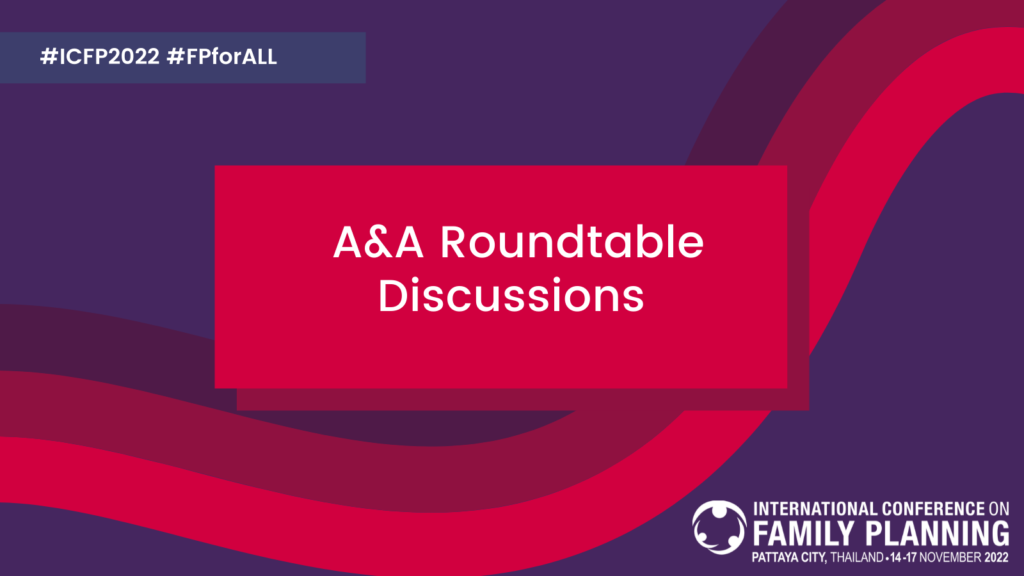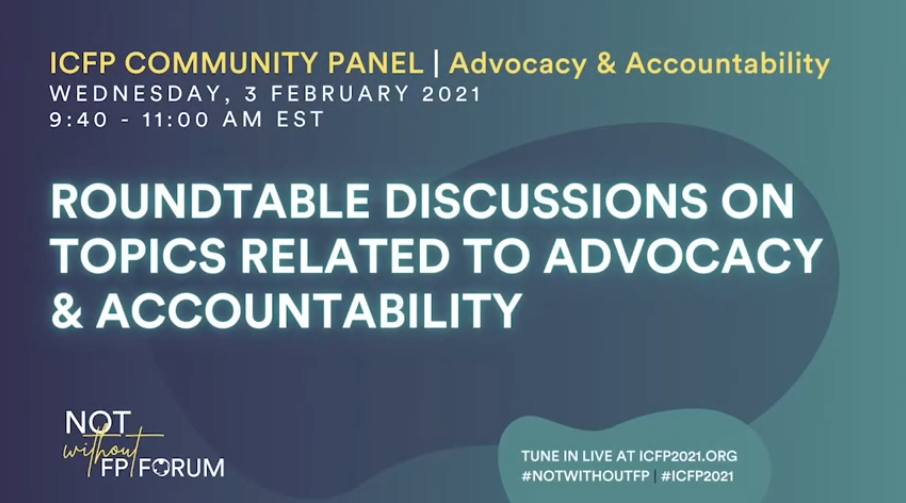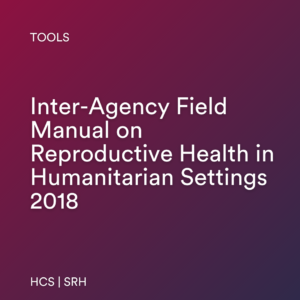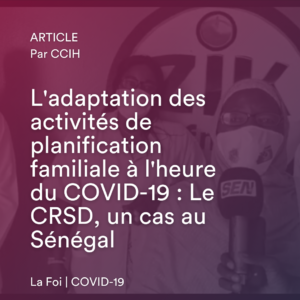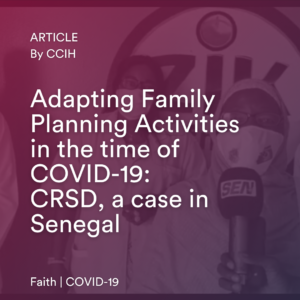Advocacy & Accountability
Community Page
About the A&A Subcommittee
The ICFP Advocacy & Accountability (A&A) subcommittee was formed in 2015. At the 2016 ICFP in Bali, A&A was featured as a spotlighted conference track for the first time in the conference’s history. Since then, recognizing that A&A is essential to the success of efforts throughout the family planning and SRHR community, it has since been integrated into all conference tracks.
The aim of the Advocacy & Accountability subcommittee is to initiate and coordinate efforts to highlight the role of advocacy and accountability at the global, regional, national and sub-national levels to ensure access to voluntary, quality family planning information, services and supplies in the context of sexual and reproductive health and rights.
Committee's Vision for ICFP2022
The A&A subcommittee will ensure that advocacy and accountability are highlighted throughout the ICFP 2022 in a variety of formats.
Members, Partners & Supporters
The subcommittee is represented by a vast array of actors in the field including local civil society organizations, NGOs, INGOs, local and global initiatives, academic institutions, donor organizations, etc.
Get In Touch
If you are interested in knowing more about the ICFP Advocacy & Accountability Subcommittee, please get in touch.
Contact: Kate Barrett
kbarrett@jhu.edu
The A&A subcommittee aims to ensure that advocacy and accountability are highlighted throughout the ICFP. There are many activities planned for the upcoming conference including:
- Finding ways to engage donors and decision makers in different ways throughout the conference
- Including advocacy and accountability in various conference sessions
- Leading roundtable discussions and exchanges on topics related to advocacy and accountability
We all have a role to play in advocacy and accountability!
Advocacy and accountability (A&A) play a critical role increasing access to and use of quality family planning services and supplies using evidence and best practices. A&A takes many forms and occurs at all levels – from influencing global platforms like the SDGS and FP2030 and holding countries accountable to their commitments to demanding reform at the local level and ensuring decision makers hear from the people impacted by their actions.
Engaging in advocacy and accountability can speed up and improve the pace, scope, and quality of change to address the ongoing challenges in family planning and ensure that words translate into meaningful action. With so many challenges and opportunities facing the global family planning community, we all have a role to play in advocacy and accountability!
Advocacy and Accountability at ICFP2022:
Youth Pre-conference, Advocacy and Accountability Skills Workshop
Saturday, November 12 and Sunday, November 13, 10 am-12pm
The Advocacy and Accountability Skills Workshop is a four-hour session over two days that will introduce a set of evidence-based tools to strengthen youth-led advocacy and accountability efforts within countries and across regions. The workshop will showcase four tools* used by advocates in a variety of political and financial settings and have led to successful advocacy achievements. These tools will help strengthen capacity and provide a platform for effective participation of adolescents and young people in the following areas:
- Reviewing, developing, and implementing country costed implementation plans.
- Developing SMART advocacy strategies addressing barriers to adolescent services.
- Understanding budget processes and learning various monitoring tactics.
- Holding decision-makers accountable on their commitments as part of citizen watch efforts.
Participants will have the opportunity to work in small groups to practice a sample set of activities within each tool. The learnings from this workshop will provide a base from which youth advocates can continue to build out their advocacy and accountability strategies after the conference ends. The workshop will be facilitated by youth advocates that have had decades of experience using these tools.
The workshop is limited to 40 youth participants. Participants must register for the workshop and are required to attend both the Saturday and Sunday two-hour sessions.
*Smart Advocacy – www.smartadvocacy.org
TARP – https://tarp.e2aproject.org/
Common Framework – https://pai.org/resources/advocating-for-government-spending-on-family-planning/
Motion Tracker – https://www.motiontracker.org/
Resetting the Pace: Expanding and Deepening Family Planning Advocacy and Accountability in the New Decade of Progress
Friday, November 18, 2022, 7:30AM – 4PM
Deepened and expanded advocacy and accountability for family planning will be critical to secure gains and accelerate progress towards 2030. Join global advocates at ICFP 2022 for a post-conference side event to engage, share, and plan action for family planning advocacy and accountability. You’ll have the opportunity to:
- Discuss ICFP’s advocacy and accountability-related takeaways and resolutions.
- Engage with the recently launched FP2030 Advocacy and Accountability Framework and build consensus for its operationalization at the regional and country level.
- Strategize and map opportunities for collaboration post-conference.
More details on the agenda and speakers will be forthcoming. We look forward to meeting you there!
Hosted by: USAID’s MOMENTUM Country and Global Leadership and UNFPA
In collaboration with: Africa Health Budget Network (AHBN), FP2030, Motion Tracker Innovator-Samasha Medical Foundation, Pathfinder, The Advocacy Accelerator, The Advocacy and Accountability Collaborative (TAAC) Global Secretariat.
Lunchtime Roundtable Discussions, November 15-16, 2022
Click here to view full details on the 12 Lunchtime Roundtable sessions hosted by the A&A subcommittee.
Featured Community Resources
Down But Not Out: Vasectomy Is Faring Poorly Almost Everywhere—We Can Do Better To Make It A True Method Option
via USAID through the MOMENTUM Safe Surgery in Family Planning and Obstetrics
Vasectomy use is surprisingly low globally and declining. For vasectomy to become an accessible, rights-based option, program efforts need to be holistic, ensuring an enabling environment while coordinating demand- and service-focused efforts. See recommendations for policymakers and donors below.

